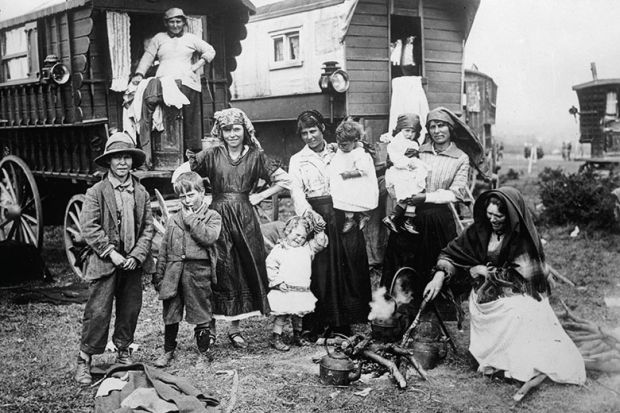The word “Gypsies” in this lively, argumentative, well-rounded, wide-ranging book is invariably prefixed with a capital letter. Cressy is dealing here with a variously composed people and not simply with a way of life. Fifty pages of endnotes and a bibliography of equal length attest not only to the author’s formidable research effort (facilitated, of course, by conveniently available databases) but also to the fact that his subject has already attracted a great deal of attention from others, and not just historians. Unlike many of these, however, Cressy maintains throughout a well-balanced stance and, although broadly sympathetic, avoids special pleading. It is a qualitative not a quantitative study. Gypsy statistics remain stubbornly elusive.
His sources, unavoidably, are predominantly “external” to the subject and are drawn from literature, drama, the writings of contemporary investigators, newspaper reports, police records, court proceedings and state papers. Jane Austen, William Cobbett and George Borrow all figure in the text. This is chiefly a book about others’ perceptions, images and stereotypes of Gypsies and (often) about their strident prejudices. The reputation attributed to Gypsies for thieving, cunning and promiscuity went before them, although some observers (including the youthful Princess Victoria) were well meaning and charitably disposed. Some reformers devoted themselves to missionary efforts among Gypsy communities and to attempts to integrate them into the social mainstream. Despite his best efforts, Cressy is seldom able to bring Gypsies’ own voices into prominence. Hearing one of them (in 1897) when defiantly paying a court fine imposed on him speak out boldly that “I was bred a Gypsy and I hope I shall remain a Gypsy as long as I live” is entirely exceptional.
Cressy heaps up an unremitting stream of examples and quotations that at times strains the reader’s digestion, and there is too much repetition. The publishers, however, are responsible for the poor quality, save for the line drawings, of many of the illustrations. Thomas Gainsborough’s Gypsy Family (c.1753) is scarcely decipherable. Some paintings by Titian and Caravaggio remain completely invisible in that they are discussed in the text without photographs to accompany them.
But the many self-evident strengths of Cressy’s book drown out any niggling criticisms. Its coverage, both in terms of its five-century chronological sweep and the breadth of its subject matter, is unquestionably impressive. He sets the record straight, for example, about Gypsy music (an 18th-century development) and those colourful “traditional” caravans (a 19th-century innovation). Accusations of Gypsy child-stealing are swiftly dismissed. Much can be learned here about Gypsy language, culture, economics, customs, rituals, taboos, ceremonies, itinerancy, family life, dynasties and changing lifestyles. Their capacity for foraging for food is well documented here. “Badger ham”, Cressy solemnly informs us, “is rated delicious by those who have tried it.” Above all, however, he departs from the well-established tendency of treating Gypsies in isolation. Here, they are successfully integrated into the wider English and, indeed, European experience. With his latest book, this exceedingly prolific historian seems certain to have yet another success on his hands.
R. C. Richardson, emeritus professor of history at the University of Winchester, is the author of numerous books, among them Household Servants in Early Modern England (2010).
Gypsies: An English History
By David Cressy
Oxford University Press
432pp, £25.00
ISBN 9780198768135
Published 12 July 2018



